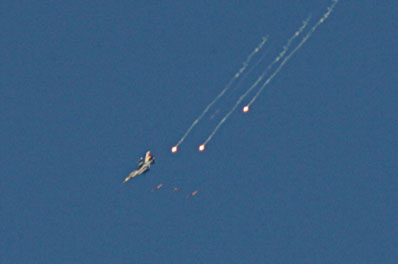Picture Kill

A Picture Kill notice has been sent out by the by the Reuters News Service and Beirut based freelance photographer Adnan Hajj has been dropped by the agency for Photoshopping news photographs of the Israeli-Hizbollah conflict.
The Reuters Website reports that they received "more than 2,000 reader e-mails on this issue over the weekend." The agency issued a kill on the photo in question:

Doctored Photo of Beirut by Adnan Hajj
and sent out an unaltered version:

Unaltered Photo of Beirut by Adnan Hajj
Reuters also reports that they have "withdrawn all photographs taken by the Beirut-based freelancer after establishing that he had altered two images since the start of the conflict between Israel and the Lebanese Hizbollah group."
"There is no graver breach of Reuters standards for our photographers than the deliberate manipulation of an image", said Tom Szlukovenyi, Reuters Global Picture Editor. "Reuters has zero tolerance for any doctoring of pictures and constantly reminds its photographers, both staff and freelance, of this strict and unalterable policy".
"Reuters terminated its relationship with Hajj on Sunday after a review of a photograph he had taken of the aftermath of an Israeli air strike on suburban Beirut the previous day found it had been manipulated using Photoshop software to show more and darker smoke rising from buildings.
An immediate enquiry began into Hajj’s other work. It found on Monday that a second photograph, of an Israeli F-16 fighter over Nabatiyeh, southern Lebanon and dated Aug 2, had been doctored to increase the number of flares dropped by the plane from one to three. The caption also misidentified the objects as missiles rather than flares, which warplanes release as a defensive measure." Here is that photo:

Doctored Photo Of Israeli F-16 over Lebanon by Adnan Hajj
"Manipulating photographs in this way is entirely unacceptable and contrary to all the principles consistently held by Reuters throughout its long and distinguished history. It undermines not only our reputation but also the good name of all our photographers," said David Schlesinger, the Reuters Global Managing Editor.
Szlukovenyi said the mere fact that Hajj had altered two of his photographs meant none of his work for Reuters could be trusted either by the news service or its users.
"This doesn’t mean that every one of his 920 photographs in our database was altered. We know that not to be the case from the majority of images we have looked at so far but we need to act swiftly and in a precautionary manner," Szlukovenyi said.
The two altered photographs were among 43 that Hajj had filed directly to the Global Pictures Desk since the start of the conflict on July 12 rather than through an editor in Beirut, as was the case with the great majority of his images.
Hajj worked for Reuters as a non-staff contributing photographer from 1993 until 2003 and again since April 2005."

0 Comments:
Post a Comment
<< Home